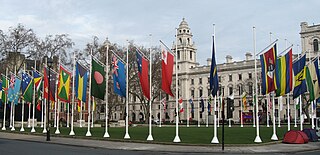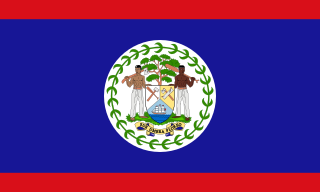
The British colonization of the Americas is the history of establishment of control, settlement, and colonization of the continents of the Americas by England, Scotland and, after 1707, Great Britain. Colonization efforts began in the late 16th century with failed attempts by England to establish permanent colonies in the North. The first of the permanent English colonies in the Americas was established in Jamestown, Virginia, in 1607. Approximately 30,000 Algonquian peoples lived in the region at the time. Colonies were established in North America, Central America, South America, and the Caribbean. Though most British colonies in the Americas eventually gained independence, some colonies have remained under Britain's jurisdiction as British Overseas Territories.

British Honduras was a Crown colony on the east coast of Central America, south of Mexico, from 1783 to 1964, then a self-governing colony, renamed Belize in June 1973, until September 1981, when it gained full independence as Belize. British Honduras was the last continental possession of the United Kingdom in the Americas.

A Commonwealth realm is a sovereign state within the Commonwealth that has Charles III as its monarch and ceremonial head of state. All the realms are equal with and independent of the others, though one person, resident in the United Kingdom, acts as monarch of each. The phrase Commonwealth realm is an informal description not used in any law.

The British West Indies (BWI) were colonised British territories in the West Indies: Anguilla, the Cayman Islands, Turks and Caicos Islands, Montserrat, the British Virgin Islands, Antigua and Barbuda, The Bahamas, Barbados, Dominica, Grenada, Jamaica, Saint Kitts and Nevis, Saint Lucia, Saint Vincent and the Grenadines, British Guiana and Trinidad and Tobago. Other territories included Bermuda, and the former British Honduras.

Commonwealth Day is the annual celebration of the Commonwealth of Nations, held on the second Monday in March. While the date holds some official status in select member states of the Commonwealth, observances of the date are not uniform across the Commonwealth, and the date is not celebrated as a public holiday in most Commonwealth countries.

The National Assembly is the bicameral legislature of the nation of Belize. It is divided into the House of Representatives, with 31 members, elected by universal suffrage, and the Senate, with 13 members, appointed by the Governor-General in consultation with the Prime Minister and the Leader of the Opposition. The presiding officer of the House is the Speaker, while the Senate is presided over by the President.
A list of former and present British colonies, dependencies and dates when they severed legal ties with Britain:

The republics in the Commonwealth of Nations are the sovereign states in the organisation with a republican form of government. As of June 2022, 36 out of the 56 member states were republics. While Charles III is the titular Head of the Commonwealth, the King is not the head of state of the republican members. The King is however, the reigning monarch in the Commonwealth realms. The Head of the Commonwealth role does not carry with it any power; instead, it is a symbol of the free association of Commonwealth members.

The Zambia Independence Act 1964 was an act of the Parliament of the United Kingdom which granted independence to Zambia with effect from 24 October 1964. It also provided for the continuation of a right of appeal from Zambia to the Judicial Committee of the Privy Council. It was introduced by Andrew Cavendish, 11th Duke of Devonshire Under-Secretary of State for Commonwealth Relations.

The Belizean–Guatemalan territorial dispute is an unresolved territorial dispute between the states of Belize and Guatemala, neighbours in Central America. During the late 1600s and throughout the 1700s, Britain and Spain signed several treaties regarding territories in the Americas. Both nations agreed that the territory of modern-day Belize was under Spanish sovereignty though British settlers could use the land, in specific areas and for specific purposes. The area was never fully under British or Spanish rule at this time and the British settlers continually expanded far past the boundaries set by the treaties. When the Spanish Empire fell, Guatemala said that it inherited Spain's sovereign rights over the territory. Since independence Guatemala has claimed, in whole or in part, the territory of Belize.

The monarchy of Belize is a system of government in which a hereditary monarch is the sovereign and head of state of Belize. The current Belizean monarch and head of state since 8 September 2022, is King Charles III. As sovereign, he is the personal embodiment of the Belizean Crown. Although the person of the sovereign is shared with 14 other independent countries within the Commonwealth of Nations, each country's monarchy is separate and legally distinct. As a result, the current monarch is officially titled Kingof Belize and, in this capacity, he and other members of the royal family undertake public and private functions as representatives of the Belizean state. However, the King is the only member of the royal family with any constitutional role.

The Commonwealth of Nations is a voluntary association of 56 sovereign states. Most of them were British colonies or dependencies of those colonies.

The history of Belize dates back thousands of years. The Maya civilization spread into the area of Belize between 1500 BC to 1200 BC and flourished until about 1000 AD. Several Maya ruin sites, including Cahal Pech, Caracol, Lamanai, Lubaantun, Altun Ha, and Xunantunich reflect the advanced civilization and much denser population of that period. The first recorded European incursions in the region were made by Spanish conquistadors and missionaries in the 16th century. One attraction of the area was the availability of logwood, which also brought British settlers.
A dominion was any of several largely self-governing countries of the British Empire. Progressing from colonies, their degrees of colonial self-governance increased unevenly over the late 19th century through the 1930s, and some vestiges of empire lasted in some areas into the late 20th century. With the evolution of the British Empire into the Commonwealth of Nations, finalised in 1949, the dominions became independent states, either as Commonwealth republics or Commonwealth realms.

The head of state of both Belize and the United Kingdom is Charles III, who holds the title King of Belize. Both nations are members of the Commonwealth of Nations and the United Nations.
Belizean nationality law is regulated by 1981 Constitution of Belize, as amended; the Belizean Nationality Act, as revised; and various British Nationality laws. These laws determine who is, or is eligible to be, a national of Belize. Belizean nationality is typically obtained either by descent or registration. Descent relies on the principles of jus soli, i.e. by birth in Belize; or under the rules of jus sanguinis, i.e. by birth abroad to parents with Belizean nationality; whereas registration applies to obtaining nationality after birth. There is currently no program in Belize for citizenship by investment, as the previous program lapsed in 2002. Nationality establishes one's international identity as a member of a sovereign nation. Though it is not synonymous with citizenship, rights granted under domestic law for domestic purposes, the United Kingdom, and thus the Commonwealth of Nations, has traditionally used the words interchangeably.













